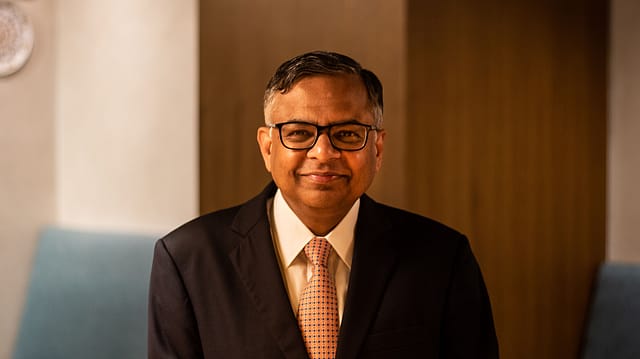India well-placed to reimagine AI, data-driven future: Chandrasekaran
ADVERTISEMENT

Tata Sons Chairman N Chandrasekaran, during a virtual event at the Confederation of Indian Industries (CII) on being future-ready today, talked about five megatrends that are going to shape the world in the coming decade. He said new technologies like artificial intelligence and data science present a huge opportunity for India, which has a tech strength.
"We are extremely well-placed to reimagine the future, every industry and business will be AI-businesses."
Talking about digital adoption, Chandrasekaran said in the last two years, the internet has penetrated ever further into daily lives. "At the same time, advances in AI, cloud and data technology have moved forward. Proprietary AI and data will separate the top-performing companies from the rest. Soon, all the businesses will have to become AI and data-driven,” he adds.
The second trend is the supply chain rebalance. "The supply issues that we experienced during the pandemic are also emerging out of geopolitical situations -- China-Us or Ukraine-Russia. So we have to fundamentally rebalance the global supply chain."
He said from the Indian perspective, it is a global opportunity. "India has an important role to fulfil by taking the leadership role in supply chain. The supply rebalancing also means a rebalancing of global growth," he adds.
January 2026
Netflix, which has been in India for a decade, has successfully struck a balance between high-class premium content and pricing that attracts a range of customers. Find out how the U.S. streaming giant evolved in India, plus an exclusive interview with CEO Ted Sarandos. Also read about the Best Investments for 2026, and how rising growth and easing inflation will come in handy for finance minister Nirmala Sitharaman as she prepares Budget 2026.
He said in the coming decade that 70% of world growth will come from emerging markets. “We are already seeing that in this financial year. India's growth is going to be higher than most countries. At the same time, India’s inflation is going to be lower than the inflation of the West.”
Third megatrend is sustainability. "It's like two trends moving in the opposite directions. On one side, pressure on making climate transition is going to increase. Any plans that we have towards making this transition will come under pressure, so the deadline will only get advanced going forward." On the other side, he said, new-age startups would find ways to address the climate-related challenges.
Talking about the fourth mega future trends, which is health, Chandrasekaran said health-related value propositions will matter in all industries. "You will see those value positions even in those industries that will seemingly look unconnected to health. Safety and convenience will be central to any business going forward," he adds.
The fifth trend is going to be the global talent pool, said Chandra. "There's going to be a lot of challenges in attracting talent and the models have to shift away from traditional ones. There will be new technology platforms attracting talent. The concept is to have the ability to access talent 24/7 from any part of the world."
He added that skills would become far more important than expensive formal education. “The whole talent architecture will change, not only in service but across all industries. Even in manufacturing, there is going to be an advanced way of manufacturing, and robots and bots will play a significant role.”
Earlier, T V Narendran, President, CII and Tata Steel CEO & MD, said that with the recalibration of global supply chains the world over, the Indian industry has a unique opportunity to expand its global footprint. "Industry should move away from the risk-averse culture. And with free trade agreements being signed with key partners, we must leverage these opportunities to the optimum," he says.
He was also of the view that it is essential for the industry to ramp up R&D expenditure for being future-ready for which collaboration with industry and academia should be explored.
